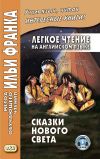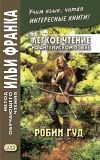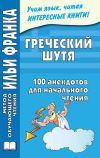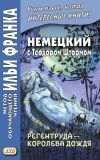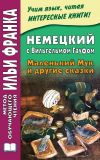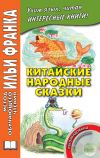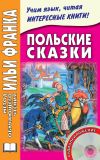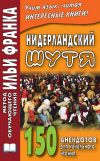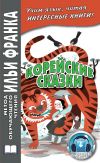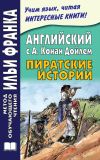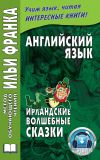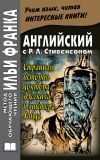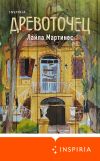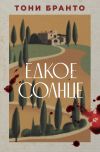Текст книги "Английский с Шерлоком Холмсом. Человек с рассеченной губой / Arthur Conan Doyle. Sherlock Holmes"
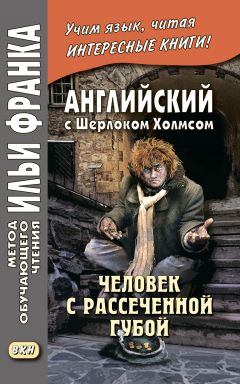
Автор книги: Артур Дойл
Жанр: Иностранные языки, Наука и Образование
Возрастные ограничения: +16
сообщить о неприемлемом содержимом
Текущая страница: 10 (всего у книги 21 страниц)
crouched [kraʋʧt], blood [blʌd], distorted [dɪs'tɔ:tɪd], countenance ['kaʋntɪnǝns], sufficient [sǝ'fɪʃ(ǝ)nt], bruise [bru:z]
“At the moment, however, we had no thought for the old chest, for our eyes were riveted upon that which crouched beside it. It was the figure of a man, clad in a suit of black, who squatted down upon his hams with his forehead sunk upon the edge of the box and his two arms thrown out on each side of it. The attitude had drawn all the stagnant blood to the face, and no man could have recognized that distorted liver‑colored countenance; but his height, his dress, and his hair were all sufficient to show my client, when we had drawn the body up, that it was indeed his missing butler. He had been dead some days, but there was no wound or bruise upon his person to show how he had met his dreadful end. When his body had been carried from the cellar we found ourselves still confronted with a problem which was almost as formidable as that with which we had started.
“I confess that so far, Watson (признаюсь, Ватсон, что пока), I had been disappointed in my investigation (я был разочарован /результатами/ расследования). I had reckoned upon solving the matter (я рассчитывал решить эту задачу; to reckon on – рассчитывать на; полагаться на; to reckon – считать, полагать) when once I had found the place referred to in the Ritual (обнаружив место, указанное в «Обряде»); but now I was there, and was apparently as far as ever from knowing (но теперь я стоял там /на том месте/, и, по-видимому, был так же далек от разгадки) what it was which the family had concealed with such elaborate precautions (что же было спрятано семейством с такими тщательными предосторожностями; precaution – предусмотрительность; мера предосторожности). It is true that I had thrown a light upon the fate of Brunton (правда, я пролил свет на участь Брантона), but now I had to ascertain how that fate had come upon him (но теперь мне нужно было выяснить, каким образом эта участь его постигла), and what part had been played in the matter by the woman who had disappeared (и какую роль сыграла в этом женщина, которая исчезла). I sat down upon a keg in the corner (я сел на бочонок в углу) and thought the whole matter carefully over (и тщательно обдумал все это дело).
“You know my methods in such cases, Watson (вы знаете мои методы в подобных случаях, Ватсон). I put myself in the man's place (я ставлю себя на место действующего лица) and, having first gauged his intelligence (и, прежде оценив его умственные способности; to gauge – измерять; оценивать /человека, характер и т. д./), I try to imagine how I should myself have proceeded under the same circumstances (я пытаюсь представить, как бы я сам поступил при тех же обстоятельствах).
concealed [kǝn'si:ld], precaution [prɪ'kɔ:ʃ(ǝ)n], gauged [ɡeɪʤd]
“I confess that so far, Watson, I had been disappointed in my investigation. I had reckoned upon solving the matter when once I had found the place referred to in the Ritual; but now I was there, and was apparently as far as ever from knowing what it was which the family had concealed with such elaborate precautions. It is true that I had thrown a light upon the fate of Brunton, but now I had to ascertain how that fate had come upon him, and what part had been played in the matter by the woman who had disappeared. I sat down upon a keg in the corner and thought the whole matter carefully over.
“You know my methods in such cases, Watson. I put myself in the man's place and, having first gauged his intelligence, I try to imagine how I should myself have proceeded under the same circumstances.
“In this case the matter was simplified by Brunton's intelligence being quite first-rate (в этом случае дело упрощалось, так как Брантон обладал весьма незаурядным умом; first-rate – первоклассный, отличный, превосходный), so that it was unnecessary to make any allowance for the personal equation (так что не было необходимости делать поправку на разницу нашего с ним мышления; to make allowance for – принимать что-либо во внимание, в расчет; делать поправку на что-либо; personal equation – поправка на личные особенности; equation – выравнивание, уравнивание), as the astronomers have dubbed it (как это назвали астрономы; to dub – ровнять; дать прозвище, окрестить). He knew that something valuable was concealed (он знал, что нечто ценное было спрятано). He had spotted the place (он определил это место). He found that the stone which covered it (обнаружил, что плита, закрывающая /вход туда/) was just too heavy for a man to move unaided (слишком тяжелая, чтобы поднять ее без посторонней помощи; aid – помощь). What would he do next (что бы он сделал затем)? He could not get help from outside (он не мог прибегнуть к помощи /людей/ со стороны), even if he had some one whom he could trust (даже если бы у него был кто-то, кому он мог доверять), without the unbarring of doors and considerable risk of detection (не отпирая двери и не подвергаясь значительному риску быть обнаруженным: «риску обнаружения»; bar – брусок; засов). It was better, if he could, to have his helpmate inside the house (было бы лучше, если бы он сумел найти помощника внутри дома). But whom could he ask (но к кому он мог обратиться)?
“This girl had been devoted to him (та девушка была предана ему; to devote – посвящать, отдавать). A man always finds it hard to realize (мужчине всегда трудно поверить) that he may have finally lost a woman's love (что он окончательно потерял любовь женщины), however badly he may have treated her (как бы плохо он с ней ни обходился).
allowance [ǝ'laʋǝns], equation [ɪ'kweɪʒ(ǝ)n], astronomer [ǝ'strɒnǝmǝ], unaided [,ʌn'eɪdɪd]
“In this case the matter was simplified by Brunton's intelligence being quite first‑rate, so that it was unnecessary to make any allowance for the personal equation, as the astronomers have dubbed it. He knew that something valuable was concealed. He had spotted the place. He found that the stone which covered it was just too heavy for a man to move unaided. What would he do next? He could not get help from outside, even if he had some one whom he could trust, without the unbarring of doors and considerable risk of detection. It was better, if he could, to have his helpmate inside the house. But whom could he ask?
“This girl had been devoted to him. A man always finds it hard to realize that he may have finally lost a woman's love, however badly he may have treated her.
“He would try by a few attentions to make his peace with the girl Howells (возможно, оказывая знаки внимания, он попытался помириться с горничной Хауэллс; attention – внимание; ухаживание), and then would engage her as his accomplice (а потом сделал ее сообщницей; to engage – нанимать; привлекать, заинтересовывать). Together they would come at night to the cellar (ночью они вместе спустились в погреб), and their united force would suffice to raise the stone (и их совместных/объединенных усилий хватило, чтобы поднять камень). So far I could follow their actions as if I had actually seen them (до этого момента я мог проследить за их действиями, будто видел их на самом деле).
“But for two of them, and one a woman (но для двух /человек/, /особенно если/ один из них женщина), it must have been heavy work the raising of that stone (поднять камень, должно быть, явилось нелегкой работой). A burly Sussex policeman and I had found it no light job (мне и дюжему суссекскому полисмену это не показалось легкой работой). What would they do to assist them (что же они сделали, чтобы помочь себе)? Probably what I should have done myself (вероятно, /то же/, что сделал бы я сам). I rose and examined carefully the different billets of wood (я встал и внимательно осмотрел поленья; to rise; different – различный) which were scattered round the floor (валявшиеся на полу). Almost at once I came upon what I expected (почти сразу же я нашел то, что ожидал /найти/). One piece, about three feet in length (одно полено, примерно три фута длиной), had a very marked indentation at one end (имело очень отчетливое углубление на конце; indentation – вдавленность; впадина; отпечаток), while several were flattened at the sides (а несколько /других/ были сплющены на концах; flat – плоский) as if they had been compressed by some considerable weight (как будто они сдавливались значительной тяжестью).
accomplice [ǝ'kɒmplɪs], burly ['bɜ:lɪ], several ['sev(ǝ)rǝl], weight [weɪt]
“He would try by a few attentions to make his peace with the girl Howells, and then would engage her as his accomplice. Together they would come at night to the cellar, and their united force would suffice to raise the stone. So far I could follow their actions as if I had actually seen them.
“But for two of them, and one a woman, it must have been heavy work the raising of that stone. A burly Sussex policeman and I had found it no light job. What would they do to assist them? Probably what I should have done myself. I rose and examined carefully the different billets of wood which were scattered round the floor. Almost at once I came upon what I expected. One piece, about three feet in length, had a very marked indentation at one end, while several were flattened at the sides as if they had been compressed by some considerable weight.
“Evidently, as they had dragged the stone up (по-видимому, приподняв плиту) they had thrust the chunks of wood into the chink (они просовывали эти поленья в щель; chunk – колода, чурбан), until at last, when the opening was large enough to crawl through (пока наконец отверстие не стало достаточно большим, чтобы протиснуться: «проползти» через него), they would hold it open by a billet placed lengthwise (они держали его открытым = подперли плиту поленом, поставленным вертикально; lengthwise – продольный, направленный в длину), which might very well become indented at the lower end (которое вполне могло получить вмятину на нижнем конце; indented – вдавленный, вогнутый), since the whole weight of the stone (так как весь вес плиты) would press it down on to the edge of this other slab (прижимал его к краю другой плиты; slab – плита; лист, пластина). So far I was still on safe ground (пока у меня по-прежнему были обоснованные предположения: «я был на надежной почве»).
“And now how was I to proceed to reconstruct this midnight drama (как же я должен был теперь восстанавливать /картину/ той полуночной драмы; to proceed – продолжать движение; действовать, поступать)? Clearly, only one could fit into the hole, and that one was Brunton (ясно, что только один /из них/ мог пролезть в отверстие, и это был Брантон; to fit – подходить, быть впору; умещаться). The girl must have waited above (девушка, должно быть, ждала наверху). Brunton then unlocked the box (затем Брантон отпер сундук), handed up the contents presumably (и, вероятно, передал наверх его содержимое) – since they were not to be found (поскольку его /содержимое/ не нашли) – and then – and then what happened (а потом… что же произошло потом)?
crawl [krɔ:l], reconstruct [,ri:kǝn'strʌkt], presumably [prɪ'zju:mǝblɪ]
“Evidently, as they had dragged the stone up they had thrust the chunks of wood into the chink, until at last, when the opening was large enough to crawl through, they would hold it open by a billet placed lengthwise, which might very well become indented at the lower end, since the whole weight of the stone would press it down on to the edge of this other slab. So far I was still on safe ground.
“And now how was I to proceed to reconstruct this midnight drama? Clearly, only one could fit into the hole, and that one was Brunton. The girl must have waited above. Brunton then unlocked the box, handed up the contents presumably – since they were not to be found – and then – and then what happened?
“What smouldering fire of vengeance (какой тлеющий огонь мести) had suddenly sprung into flame (внезапно вспыхнул; flame – пламя) in this passionate Celtic woman's soul (в пылкой душе этой кельтской женщины) when she saw the man who had wronged her (когда она увидела, что мужчина, который обидел ее; to wrong – причинять зло, обижать; поступать несправедливо, подло; wrong – вред, зло; обида) – wronged her, perhaps, far more than we suspected (обидел, возможно, намного сильнее, чем мы подозревали) – in her power (находится в ее власти)? Was it a chance that the wood had slipped (случайно ли полено соскользнуло), and that the stone had shut Brunton into what had become his sepulcher (и плита замуровала Брантона в /комнатке/, которая стала его могилой; sepulcher – склеп, могила, гробница)? Had she only been guilty of silence as to his fate (виновна ли она только в молчании относительно его судьбы = только в том, что умолчала о его судьбе)? Or had some sudden blow from her hand dashed the support away (или внезапный удар ее руки выбил подпорку) and sent the slab crashing down into its place (и плита упала с грохотом на свое /прежнее/ место: «и послал плиту грохнуться…»)? Be that as it might (как бы то ни было: «пусть будет так, как это могло бы»), I seemed to see that woman's figure still clutching at her treasure trove (я словно видел, как эта женщина прижимает к себе сокровище; treasure trove – найденный клад /не имеющий владельца/; trove – находка) and flying wildly up the winding stair (и летит = стремительно бежит вверх по винтовой лестнице), with her ears ringing perhaps with the muffled screams from behind her (а в ее ушах звучат приглушенные крики, /раздающиеся/ ей вслед; from behind – из-за, позади) and with the drumming of frenzied hands against the slab of stone (отчаянный стук рук по каменной плите; drum – барабан; to drum – барабанить, стучать, колотить; frenzied – бешеный, яростный; лихорадочный) which was choking her faithless lover's life out (под которой задыхался ее неверный возлюбленный; to choke – душить; задыхаться; заглушать; faithless – вероломный, неверный).
vengeance ['venʤ(ǝ)ns], sepulchre ['sep(ǝ)lkǝ], guilty ['ɡɪltɪ], treasure ['treʒǝ]
“What smouldering fire of vengeance had suddenly sprung into flame in this passionate Celtic woman's soul when she saw the man who had wronged her – wronged her, perhaps, far more than we suspected – in her power? Was it a chance that the wood had slipped, and that the stone had shut Brunton into what had become his sepulchre? Had she only been guilty of silence as to his fate? Or had some sudden blow from her hand dashed the support away and sent the slab crashing down into its place? Be that as it might, I seemed to see that woman's figure still clutching at her treasure trove and flying wildly up the winding stair, with her ears ringing perhaps with the muffled screams from behind her and with the drumming of frenzied hands against the slab of stone which was choking her faithless lover's life out.
“Here was the secret of her blanched face (вот в чем была загадка ее бледного лица), her shaken nerves (расшатанных нервов), her peals of hysterical laughter on the next morning (приступов истерического смеха на следующее утро; peal – звон; раскат /грома/; взрыв /смеха/). But what had been in the box (но что же было в сундуке)? What had she done with that (что она с этим сделала)? Of course, it must have been the old metal and pebbles (несомненно, это были те /обломки/ старого металла и галька) which my client had dragged from the mere (которые мой клиент вытащил из пруда). She had thrown them in there at the first opportunity (горничная бросила их туда при первой возможности) to remove the last trace of her crime (чтобы скрыть последний след = все следы своего преступления).
“For twenty minutes I had sat motionless (двадцать минут я сидел неподвижно), thinking the matter out (раздумывая над этим делом). Musgrave still stood with a very pale face (Месгрейв все еще стоял с очень бледным лицом), swinging his lantern and peering down into the hole (раскачивая фонарь и заглядывая в яму).
“'These are coins of Charles the First (это монеты /эпохи/ Карла Первого; Карл Первый Стюарт /1600–1649/ – английский король; казнен во время Английской буржуазной революции),' said he, holding out the few which had been in the box (сказал он, протягивая несколько /кружков/, находившихся в сундуке); 'you see we were right in fixing our date for the Ritual (видите, мы правильно определили время /записи/ «Обряда»).'
laughter ['lɑ:ftǝ], opportunity [,ɒpǝ'tju:nǝtɪ], lantern ['læntǝn]
“Here was the secret of her blanched face, her shaken nerves, her peals of hysterical laughter on the next morning. But what had been in the box? What had she done with that? Of course, it must have been the old metal and pebbles which my client had dragged from the mere. She had thrown them in there at the first opportunity to remove the last trace of her crime.
“For twenty minutes I had sat motionless, thinking the matter out. Musgrave still stood with a very pale face, swinging his lantern and peering down into the hole.
“'These are coins of Charles the First,' said he, holding out the few which had been in the box; 'you see we were right in fixing our date for the Ritual.'
“'We may find something else of Charles the First (мы можем найти еще кое-что, /оставшееся от/ Карла Первого),' I cried, as the probable meaning of the first two questions of the Ritual broke suddenly upon me (вскричал я, когда вероятное значение первых двух вопросов «Обряда» внезапно пришло мне в голову; to break upon – осенить кого-либо, внезапно прийти в голову кому-либо). 'Let me see the contents of the bag (покажите-ка мне содержимое мешка) which you fished from the mere (который вы выудили из пруда).'
“We ascended to his study (мы поднялись в его кабинет), and he laid the debris before me (и он разложил передо мной обломки; debris – осколки; обломки). I could understand his regarding it as of small importance when I looked at it (я понял, почему он не придает им большого значения, когда взглянул на них), for the metal was almost black (так как металл был почти черен) and the stones lustreless and dull (а камешки тусклы; lusterless – тусклый; без блеска; dull – тусклый, неяркий). I rubbed one of them on my sleeve, however (однако я потер один из них о рукав), and it glowed afterwards like a spark in the dark hollow of my hand (и он засверкал, будто искра, на моей темной ладони; hollow – впадина, ямка, углубление). The metal work was in the form of a double ring (металлические части имели вид двойного обруча; ring – кольцо, обруч, ободок), but it had been bent and twisted out of its original shape (но были погнуты и перекручены, /потеряв/ первоначальную форму; to bend).
ascended [ǝ'sendɪd], debris ['deɪbri:], dark [dɑ:k]
“'We may find something else of Charles the First,' I cried, as the probable meaning of the first two questions of the Ritual broke suddenly upon me. 'Let me see the contents of the bag which you fished from the mere.'
“We ascended to his study, and he laid the debris before me. I could understand his regarding it as of small importance when I looked at it, for the metal was almost black and the stones lustreless and dull. I rubbed one of them on my sleeve, however, and it glowed afterwards like a spark in the dark hollow of my hand. The metal work was in the form of a double ring, but it had been bent and twisted out of its original shape.
“'You must bear in mind (вы должны помнить),' said I, 'that the royal party made head in England (что королевская партия главенствовала в Англии; party – партия; группа, свита; to make head – продвигаться вперед) even after the death of the king (даже после смерти короля), and that when they at last fled (и когда ее члены наконец бежали; to flee – убегать, спасаться бегством) they probably left many of their most precious possessions buried behind them (они, вероятно, спрятали многие свои самые ценные вещи; possessions – собственность; имущество; пожитки; to bury – зарывать), with the intention of returning for them in more peaceful times (с намерением вернуться за ними в более мирные/спокойные времена).'
“'My ancestor, Sir Ralph Musgrave, was a prominent Cavalier (мой предок, сэр Ральф Месгрейв, был видным роялистом; cavalier – всадник, кавалерист; Cavalier – «кавалер», роялист /сторонник Карла Первого во время Английской буржуазной революции/) and the right-hand man of Charles the Second in his wanderings (и правой рукой Карла Второго во время его скитаний; Карл Второй Стюарт /1630–1685/ – английский король, сын Карла Первого),' said my friend.
“'Ah, indeed (ах, вот оно что)!' I answered (ответил я). 'Well, now, I think that really should give us the last link that we wanted (ну, теперь, думаю, это даст нам последнее звено, которого нам не хватало). I must congratulate you on coming into the possession (должен поздравить вас со вступлением во владение), though in rather a tragic manner (хотя и весьма трагическим образом = при трагических обстоятельствах) of a relic which is of great intrinsic value (одной реликвией, которая представляет огромную ценность сама по себе; intrinsic value – действительная, реальная стоимость), but of even greater importance as an historical curiosity (но имеет даже большее значение как историческая редкость; curiosity – любознательность; любопытство; диковина, редкость: curiosity shop – антикварный магазин; лавка древностей).'
“'What is it, then (что же это такое)?' he gasped in astonishment (изумленно спросил он; to gasp – дышать с трудом, задыхаться).
“'It is nothing less than the ancient crown of the kings of England (не что иное: «ничто не меньше» как древняя корона английских королей).'
“'The crown (корона)!'
England ['ɪnɡlǝnd], precious ['preʃǝs], congratulate [kǝn'ɡrætjʋleɪt]
“'You must bear in mind,' said I, 'that the royal party made head in England even after the death of the king, and that when they at last fled they probably left many of their most precious possessions buried behind them, with the intention of returning for them in more peaceful times.'
“'My ancestor, Sir Ralph Musgrave, was a prominent Cavalier and the right‑hand man of Charles the Second in his wanderings,' said my friend.
“'Ah, indeed!' I answered. 'Well, now, I think that really should give us the last link that we wanted. I must congratulate you on coming into the possession, though in rather a tragic manner of a relic which is of great intrinsic value, but of even greater importance as an historical curiosity.'
“'What is it, then?' he gasped in astonishment.
“'It is nothing less than the ancient crown of the kings of England.'
“'The crown!'
“'Precisely (совершенно верно). Consider what the Ritual says (вспомните, что говорится в «Обряде»): How does it run (как там написано; to run – бежать; гласить /о документе, тексте и т. п./)? “Whose was it (кому это принадлежит)?” “His who is gone (тому, кто ушел).” That was after the execution of Charles (это было /написано/ после казни Карла). Then, “Who shall have it (далее: «Кому это будет принадлежать»)?” “He who will come (тому, кто придет).” That was Charles the Second, whose advent was already foreseen (это был Карл Второй, вступление на престол которого уже предвиделось; advent – наступление /эпохи, события/, прибытие, приход; to foresee). There can, I think, be no doubt that this battered and shapeless diadem (полагаю, не может быть сомнений в том, что эта измятая и бесформенная корона) once encircled the brows of the royal Stuarts (некогда венчала головы королей /династии/ Стюартов; to encircle – опоясывать; окружать; brow – бровь; лоб, чело).'
“'And how came it in the pond (а как она попала в пруд)?'
“'Ah, that is a question that will take some time to answer (это вопрос, на которой сразу не ответишь: «который потребует некоторого времени для ответа»).'
And with that I sketched out to him the whole long chain of surmise and of proof (и я кратко изложил всю длинную цепь моих предположений и доказательств; sketch – эскиз, набросок; описание в общих чертах) which I had constructed (которую я выстроил). The twilight had closed in (сумерки наступили) and the moon was shining brightly in the sky (и луна ярко засияла в небе) before my narrative was finished (прежде чем мой рассказ был закончен).
“'And how was it then that Charles did not get his crown when he returned (но почему же Карл не получил обратно свою корону, когда вернулся)?' asked Musgrave, pushing back the relic into its linen bag (спросил Месгрейв, засовывая реликвию обратно в полотняный мешочек).
execution [,eksɪ'kju:ʃ(ǝ)n], diadem ['daɪǝdǝm], brow [braʋ], surmise [sǝ'maɪz]
“'Precisely. Consider what the Ritual says: How does it run? “Whose was it?” “His who is gone.” That was after the execution of Charles. Then, “Who shall have it?” “He who will come.” That was Charles the Second, whose advent was already foreseen. There can, I think, be no doubt that this battered and shapeless diadem once encircled the brows of the royal Stuarts.'
“'And how came it in the pond?'
“'Ah, that is a question that will take some time to answer.'
And with that I sketched out to him the whole long chain of surmise and of proof which I had constructed. The twilight had closed in and the moon was shining brightly in the sky before my narrative was finished.
“'And how was it then that Charles did not get his crown when he returned?' asked Musgrave, pushing back the relic into its linen bag.
“'Ah, there you lay your finger upon the one point (о, здесь вы затрагиваете вопрос; to lay a finger upon – затрагивать: «класть палец на») which we shall probably never be able to clear up (на который, вероятно, мы никогда не сможем ответить; to clear up – прояснить, выяснить). It is likely that the Musgrave who held the secret died in the interval (возможно, что тот Месгрейв, который хранил эту тайну, затем умер), and by some oversight left this guide to his descendant (и по недосмотру оставил это руководство /«Обряд»/ своему потомку) without explaining the meaning of it (не объяснив его смысла). From that day to this it has been handed down from father to son (с того дня до сегодняшнего документ передавался от отца к сыну), until at last it came within reach of a man (пока наконец не попал в руки человека) who tore its secret out of it (который смог узнать: «вырвать» его тайну; to tear out) and lost his life in the venture (и лишился жизни, пытаясь найти сокровища; to lose; venture – рискованное, смелое предприятие; опасная затея, авантюра).'
“And that's the story of the Musgrave Ritual, Watson (такова история «Обряда /дома/ Месгрейвов», Ватсон). They have the crown down at Hurlstone (корона хранится в Херлстоне) – though they had some legal bother and a considerable sum to pay (хотя им /владельцам/ пришлось перенести некоторые юридические хлопоты и заплатить значительную сумму; to bother – надоедать, беспокоить) before they were allowed to retain it (прежде чем им позволили оставить ее /у себя/; to retain – удерживать; сохранять). I am sure that if you mentioned my name (уверен, что если вы упомянете мое имя) they would be happy to show it to you (они с радостью покажут ее вам). Of the woman nothing was ever heard (о той женщине больше ничего не слышали), and the probability is that she got away out of England (вероятно, она покинула Англию; probability – вероятность, возможность; to get away – удирать; уезжать) and carried herself and the memory of her crime to some land beyond the seas (и увезла память о своем преступлении в заморские края: «в страну за морями»).”
descendant [dɪ'sendǝnt], son [sʌn], crown [kraʋn], legal ['li:ɡ(ǝ)l]
“'Ah, there you lay your finger upon the one point which we shall probably never be able to clear up. It is likely that the Musgrave who held the secret died in the interval, and by some oversight left this guide to his descendant without explaining the meaning of it. From that day to this it has been handed down from father to son, until at last it came within reach of a man who tore its secret out of it and lost his life in the venture.'
“And that's the story of the Musgrave Ritual, Watson. They have the crown down at Hurlstone – though they had some legal bother and a considerable sum to pay before they were allowed to retain it. I am sure that if you mentioned my name they would be happy to show it to you. Of the woman nothing was ever heard, and the probability is that she got away out of England and carried herself and the memory of her crime to some land beyond the seas.”
Правообладателям!
Это произведение, предположительно, находится в статусе 'public domain'. Если это не так и размещение материала нарушает чьи-либо права, то сообщите нам об этом.